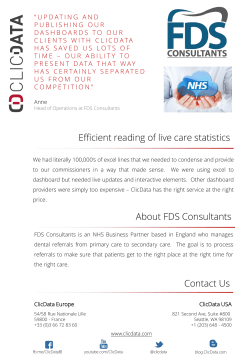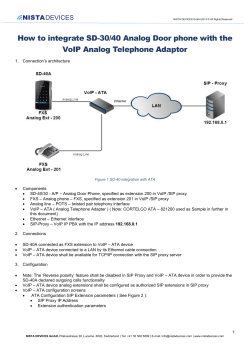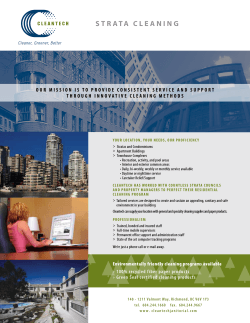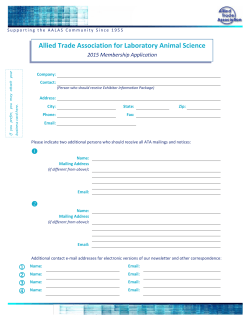
Cruise tourism in the Baltic Sea - The case of Bornholm
Job Profile Senior Adviser (N1) Greening Agricultural Transformation in Ethiopia Programme Ethiopia Reference number: DK-53453-2014/ETI.01-W 1. Preliminary 1.1. Short background: With the aim of sustainably increase small holder farmers’ income in Amhara, Oromia, SNNP and Tigray region, the Embassy of Denmark in Addis Ababa started implementing a three years thematic programme entitled Greening Agricultural Transformation in Ethiopia (GATE) with a total budget of 177.5 million DKK. Under the GATE programme there are two development engagements: support to the Agricultural Transformation Agency (ATA) and support to the Climate Resilient Green Economy (CRGE) Facility. The Embassy of Denmark in Addis Ababa aims to support the ATA to carry out its mandates in a climate smart and environmentally sustainable way through building capacity and implementation of selected ‘green’ deliverables under the Transformation Agenda. A placement of long term senior advisor at the CEO office of the ATA is part of this agreed support. The senior advisor is expected to build capacity for addressing the development and implementation of needed policies, procedures and strategies to successfully implement GATE and ATA’s plans to significantly extend its activities with donors, implementation partners (including NGOs), MoA/public sector partners, and the private sector. 1.2. Purpose of memo: This memo describes the main tasks involved in the position and the qualifications requested from candidates to the job. 1.3. Expected composition of recruitment committee: Applicants for the position will be selected for interview by the Danish embassy following consultation with the local authorities, who will also be represented at the job interview. Mercuri Urval will participate in the process of appointment by conducting personality tests and test interviews with the selected candidates, as well as taking part in the final interview. The final interview panel consists of the sector coordinator from the Embassy, a representative from the local authorities, and the consultant from Mercuri Urval A/S in charge of the recruitment process. 2. The Programme 2.1. The programme in brief: The Embassy of Denmark in Addis Ababa is starting the implementation of a new programme entitled Greening Agricultural Transformation in Ethiopia (GATE) Programme 2014 – 2017, with the development objective of sustainably increasing rural incomes. The support to ATA to Greening Agricultural Transformation is one of the two development engagements planned to be supported under the GATE Programme. The total funding for the ATA development engagement is DKK 150 million. The objective of the ATA engagement is to implement the Agricultural Transformation Agenda in a climate smart manner. The engagement has four outcomes: Outcome 1.1. Outcome 1.2. Outcome 1.3. Outcome 1.4. Climate smart farming technologies and practices are developed and promoted within smallholder farmer production through key agricultural systems Technologies and practices relating to sustainable on-farm Natural Resources Management and Water Resources Development are promoted through key agricultural systems and gradually adopted by smallholder farmers Value chain actors understand and start adopting climate smart technologies and practices along selected value chains Human and institutional capacity for climate mainstreaming and donor coordination is increased within ATA and for climate mainstreaming also within its key implementation partners The Agricultural Transformation Agency (ATA), an agency within the Government of Ethiopia, began operations in August 2011 with the mission to catalyse the transformation of the agricultural sector in Ethiopia and thereby enable the country to achieve middle income status by 2025. It reports to the Transformation Council, which is chaired by the Prime Minister, with the Minister of Agriculture as the Deputy Chairperson. ATA secures funds from the Government of Ethiopia and from development partners, and since its inception, has secured over $50 million USD. ATA adjusts its budgets annually and semi-annually to meet the requests of the Transformation Council and to take advantage of successful programmatic opportunities that are poised for quick scale-up with the potential to rapidly achieve high impact on a large number of farmers including women and youth. ATA currently has 220 staff and works with its implementing partners in 251 woredas (districts with an average population size of 100,000) in four regions. As the demands for ATA’s involvement in the agricultural sector have grown, so has its organizational structure and staff size. ATA expects organisational growth to slow dramatically in the coming years. The ATA’s engagements take place across a targeted set of issues and geographies and are organized through four types of Program Teams. • Value chains: ATA’s value chain programs address the production and marketing needs of specific crops that have the greatest potential to impact smallholder farmers. • Systems: These programs are the key building blocks to address the main systemic bottlenecks in all value chains so that increased crop production and income generation can become sustainable. • Crosscutting Initiatives and Analytics: These programs focus on issues that cut across multiple programs and seek to address specific areas that are important to the long-term viability and sustainability of the value chain and systems programs. • Special Projects: This area contains projects where there is no public sector partner and ATA has taken the role of lead agency. All of the ATA’s work takes place through partnerships with multiple stakeholders. These include the MoA and Regional Bureaus who own and drive the agriculture agenda at the federal and regional levels; development partners who provide critical thought partnership and financial support; the private sector, NGOs and civil society organizations who are often implementing many of the initiatives within the agriculture sector; and public sector and farmer organizations at the woreda and kebele (the lowest level administrative unit of the government with 10,000 population on average) level who are often on the front line of engaging and supporting Ethiopia’s smallholder farmers. ATA uses a hybrid staffing model consisting of both national and international staff in order to rapidly establish ATA and achieve results. Over time, ATA will gradually replace all contract employees who are not long-term, local recruits (see below) so that the institution is fully a nationally-run organization. There are three types of employees at ATA: Long Term Local Recruits; International Seconded Employees; and Consultants (International and Local). The ATA is a focused organization that is working to secure the transformation of Ethiopian agriculture through new approaches to solving major problems facing the sector. Thus, challenges past practices that have limited effectiveness. This and the lack of clarity on the role of the ATA and the Ministry of Agriculture created sensitivity and challenge to establish smooth relationship. ATA is a young and dynamic organization and that needs to deliver more long term results to be fully accepted in sector. 2.2. Requirements and expectations from stakeholders: The key responsibilities/outputs of this role will include, but not limited to, the transferring of skills and supporting of capacity development of ATA staff and programs, from the ATA Office of the CEO, in the following areas: • • • • • 3. Policies and procedures necessary for robust deliverable management throughout the program lifecycle, including stakeholder alignment, deliverable setting, budgeting, milestone setting and tracking, implementation and reporting The development/updating/management of internal programming guidelines, including guidance and capacity building for successful integration of programming needs/procedures throughout ATA program verticals (Systems, Value Chains, Cross Cutting Initiatives) Provide support in setting up joint-programming policies and procedures for ATA, including harmonization and reporting on donor support to the Transformation Agenda Establish detailed policies and procedures, as well as provide strategic support to key ATA staff in establishing and managing sub-granting processes for private sector partners The potential establishment of an ATA unit with the responsibility of external global reporting to key stakeholders, including donors and Government partners. The Position 3.1. Title: International Senior Adviser (N1) 3.2. Place of service: The Agricultural Transformation Agency, Addis Ababa, Ethiopia 3.3. The Conditions of employment: The conditions will be managed according to the “Staff Regulations for Advisors and Long term Advisors October 2014” The contract period is three years. Attractive salary based on qualifications and family status. 3.4. Special conditions relating to the post: The position will be long term advisor and for three years, ending December 2017. The Embassy will authorise the advisor to rent suitable accommodation directly on the private market with in an estimated average price range and subject to Embassy endorsement of the standard and the security aspects of the intended residence. 3.5. Area of responsibility/tasks: Short term (Inception Phase) • Provide support in setting up joint-programming policies and procedures for ATA, including harmonization and reporting on donor support to the Transformation Agenda • Establish detailed policies and procedures, as well as provide strategic support to key ATA staff in establishing and managing sub-granting processes for private sector partners • Facilitating the implementation of the road map for enhancing ATA’s climate Mainstreaming efforts • Taking part in the development and revision of policies, procedures and guidelines Long term: • Policies and procedures necessary for robust deliverable management throughout the program lifecycle, including stakeholder alignment, deliverable setting, budgeting, milestone setting and tracking, implementation and reporting • The development/updating/management of internal programming guidelines, including guidance and capacity building for successful integration of programming needs/procedures throughout ATA program verticals (Systems, Value Chains, Cross Cutting Initiatives) • The potential establishment of an ATA unit with the responsibility of external global reporting to key stakeholders, including donors and Government partners 3.6. Success criteria: Short term • Donor coordination system (joint programming and reporting) in place • Sub-granting management unit in place and procedures and guidelines in place especially to sub-grant to private sector and fund disbursed and managed accordingly • Implementation of the road map for enhancing ATA’s climate Mainstreaming efforts started Long term • Improved necessary policies and procedures for robust deliverable management, including stakeholder alignment, deliverable setting, budgeting, milestone setting and tracking, implementation and reporting • Developed/ updated management of internal programming guidelines, including guidance and capacity building for successful integration of programming needs/procedures throughout ATA program verticals (Systems, Value Chains, Cross Cutting Initiatives) 4. Demand profile/qualifications 4.1 Requirements and expectations concerning the candidates’ formal qualifications: • • Educational background: M.Sc. or above in the field of development management and/or planning, development economics or related areas Work experience and Developing Country experience: o Extensive demonstrated international experience in high level programming and donor management within international development and public policy in relevant countries • • • o Specific international development experience within agricultural development highly desirable o Specific experience in management/strategy consulting highly desirable o Knowledge of green growth and climate change programming and implementation issues would be a distinct advantage experience of development assistance (e.g. technical implementation, capacity development, planning, supervision), experience of specific assistance activities (e.g. familiarity with Danida procedures, financial control and reporting, cooperation with other donors), language skills, English is the working language of The ATA 4.2 Requirements and expectations concerning the personal qualifications of the candidates: ! ! ! ! ! 5. Ability to work in a team in a multi stakeholder environment Flexibility, patience and ability to adjust Strong analytical and strategic skills Ability to get and keep the overview of things and get to the point The candidate must also have good communication skills as well as a strong motivation for sharing knowledge and build capacity at all levels. Recruitment Procedure 5.1 How do you apply Information about the mandatory application procedure can be found at: www.danidajob.um.dk. Reference number DK-53453-2014/ETI.01-W should be stated in the application. 5.2 Deadline for applications: January 29 2015 at 12 noon (CET). 5.3 Preliminary interviews and personal evaluation: week 9/2015. Mercuri Urval will conduct a personal evaluation of selected candidates. 5.4 Language test: The Ministry of Foreign Affairs has decided that all candidates called in for interview - except for those to whom the relevant language is mother tongue - shall be language tested in Denmark in the working languages of the duty station (i.e. English). 5.5 Presentation to the appointments committee: February 25 2015 5.6 Decision: A decision is expected during week 9 5.7 Expected commencement: As soon as possible
© Copyright 2025









